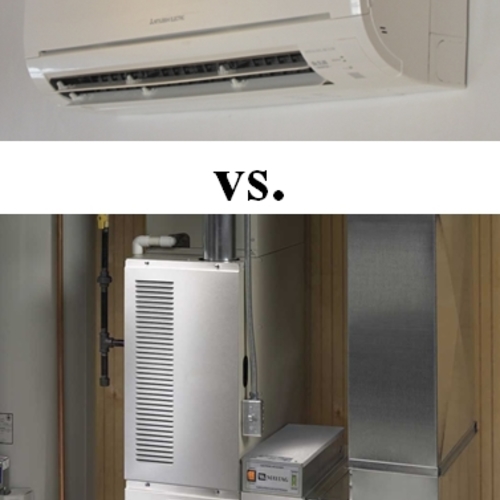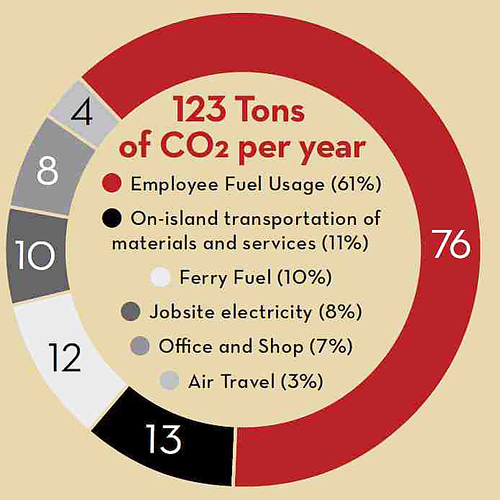Image Credit: Energy Vanguard
Al Gore is in the news again. His new climate change movie, An Inconvenient Sequel: Truth to Power, is in theaters now. And that means the folks who don’t believe in climate change — or at least folks who don’t believe that humans have any impact on it — are out in force trying to discredit the message.
As was the case 10 years ago when Gore’s original movie came out, they’re going after his carbon footprint and making the case that he’s a hypocrite. Let’s take a look at the issues.
Al Gore’s carbon footprint
The National Center for Public Policy Research (NCPPR) released a report this month on Gore’s energy use. Titled Al Gore’s Inconvenient Reality, it gives the findings of their research into the electricity consumption of the Gore home in Tennessee. And the authors are shocked, I tell you. “The findings were shocking,” they write, before detailing the highlights. Here are three of their six bullet points:
- The past year, Gore’s home energy use averaged 19,241 kilowatt hours (kWh) every month, compared to the U.S. household average of 901 kWh per month.
- Gore guzzles more electricity in one year than the average American family uses in 21 years.
- Gore paid an estimated $60,000 to install 33 solar panels. Those solar panels produce an average of 1,092 kWh per month, only 5.7% of Gore’s typical monthly energy consumption.
I found out about the NCPPR report when friends and readers of this blog began sending me links to the report and articles about it because they mentioned one of my articles. Here’s what they said:
According to Energy Vanguard, a company devoted to making homes more energy efficient, an “efficient” home uses between 5-10 kWh of electricity per square foot each year. A house that consumes 15 kWh per square foot or more of electricity per year is categorized as “bad” due to its inefficiency and excessive electricity consumption. Homes that expend more than 20 kWh of electricity per square foot each year are labeled “energy hogs,” which is Energy Vanguard’s worst rating.
I’m happy to see my article quoted, and they didn’t do too bad a job with it. There are, however, a couple of problems with how they used what I wrote. That scale gives you a glimpse into how much opportunity for savings there might be in your home, but if you’re running an office out of your home, that changes things. Also, this analysis tells you only about energy use intensity, not carbon footprint.
Déjà vu all over again
If all this sounds familiar, it’s because we went through the same thing a decade ago. Gore releases movie. Climate change obfuscators attack Gore’s personal energy use. Everyone screams, “Hypocrisy!” In that first round, Gore did something about it. He undertook a huge energy retrofit of his home in Nashville.
The lead photo above is from that retrofit. I was the regional manager for the EarthCraft House program at the time, and the team in charge of the retrofit was considering getting that certification. I think in the end they never followed through on the EarthCraft certification, although the home did get LEED-certified, I believe.
During the period when the work was happening the summer of 2007, I got to visit the house. In the photo at the top of this article, you can see the new double-pane, low-e windows waiting to be installed as they got rid of the single-pane windows. They encapsulated attics and crawl spaces, put in a lot of spray foam insulation, installed ground-source heat pumps (a.k.a. geothermal), replaced and sealed the ductwork, and installed a photovoltaic array on the roof. It was an impressive operation, on a much larger scale than the home performance projects I worked on in my earlier life as a contractor.
Gregory Thomas’s company, Performance Systems Development in Ithaca, NY, was brought in afterward to analyze the results, and Thomas said this about the project: “The retrofit was an electrification of a large home that also serves as an office for the former Vice President’s staff. There were natural gas boilers for heating and hot water and after the retrofit there was only cooking gas. All off-site electricity was purchased from renewable sources, no offsets for the electricity. All said and done, the carbon footprint on this house is really low.”
Gore’s communications director told the New Republic, “Vice President Gore leads a carbon-neutral life by purchasing green energy, reducing carbon impacts, and offsetting any emissions that cannot be avoided, all within the constraints of an economy that still relies too heavily on dirty fossil fuels.”
So, two things need to be pointed out. Energy use isn’t the same as carbon footprint. Yeah, we can argue about the significance of purchasing renewable energy that comes in through the same wires as the dirtiest coal-fired electricity, but we’ll save that for the comments below or another article. The other thing is that Gore’s house isn’t just a residence. He’s running an office with staff out of that building as well.
The truth about Al Gore’s carbon footprint
All this talk about Al Gore’s personal carbon footprint is meant to do one thing: distract. It’s a red herring. The New Republic makes the case that Al Gore’s carbon footprint doesn’t matter in an article they published last week. They’ve said it much more eloquently and completely than I’ll do here, so you really should read their piece. In short, the message put out by Al Gore and others climate change leaders is that individual actions can help on a small scale, but it’s the large scale carbon emissions that are the key.
David Roberts, a writer for Vox, is one of the clearest voices speaking out about climate change and all the crazy debate we in the United States just can’t seem to get past. (He’s well worth following on Twitter, too.) He spoke about the hypocrisy issue in an article about criticism of Leonardo DiCaprio. In it he wrote, “DiCaprio’s personal emissions are a fart in the wind when it comes to climate change. If he vanished tomorrow, and all his emissions with him, the effect on global temperature, even on US emissions, even on film-industry emissions, would be lost in the noise.”
Here’s another way to think about it. Your personal residence uses energy, and depending on where you live, the electricity delivered to your home may be really dirty. Think coal power plants, billowing out plumes of carbon dioxide laden exhaust. Or it may come from hydro, wind, and solar and have very low carbon emissions. It all depends on where you live and where your local utility purchases power.
If you get dirty electricity and want to do something about it, you could undertake an energy retrofit of your home. I’m all in favor of that, of course, but to cut your energy bills in half, say, you’re going to have to put up a bunch of money or get a good financing deal. That’s not always easy to do. Another thing you could do is install some photovoltaic modules on your home to generate solar electricity. Well, first you may need permission from your homeowners’ association. Then the laws in your state or the rules of your utility may have a say in how expensive it’ll be for you to do so.
No, to tackle this problem, it’s got to be done on a much larger scale than Al Gore or Leo DiCaprio can affect with their personal energy use, much less with what you can accomplish with your home. But by educating people about the issue and getting pressure on decision makers, we can have an impact on the large scale.
In addition, the hypocrisy charge just doesn’t ring true because Gore isn’t telling people the solution to this problem will come through individuals cutting back. Here’s what that New Republic article says:
Advocates like Gore certainly have suggested ways individuals can do their part. In 2007, he stated, “The only way to solve this [climate] crisis is for individuals to make changes in their own lives.” But just a year later, he said, “In addition to changing the light bulbs, it is far more important to change the laws and to change the treaty obligations that nations have.” Last month, he said the three best ways are to talk about climate change (which he does), look for environmentally responsible choices when making large purchases (which he does), and support climate-friendly political candidates (which he does). Individual action has never been the focus of his message.
Oh, one more thing about the National Center for Public Policy Research’s calling out of Gore for hypocrisy. One thing they’ve done a fair amount of over the years is to fight against climate scientists who speak out publicly. I wonder if that nearly half a million dollars they received from ExxonMobil has anything to do with it?
The bottom line here is that it doesn’t really matter how much energy Al Gore uses, even if he does use green energy and purchase offsets. What matters is that the Earth is heating up. What matters is that about 95% of scientists who work in the field have concluded humans are causing the accelerated climate change by dumping vast quantities of carbon dioxide into the atmosphere. What matters is that we don’t have much time to turn things around. Dropping out of the Paris Accord makes it harder to effect change on the large scale.
And large-scale change is what we need most.
Allison Bailes of Decatur, Georgia, is a speaker, writer, building science consultant, and the author of the Energy Vanguard Blog. You can follow him on Twitter at @EnergyVanguard.
Weekly Newsletter
Get building science and energy efficiency advice, plus special offers, in your inbox.
















18 Comments
Al Gore
Allison: Yes, I agree we need to conserve (use less) and reduce CO2 output. However, I disagree that the behavior of people who support CO2 reductions don't matter. If I tell my kids that lying is bad but I continually get caught lying, what does that tell my kids? Same with Gore and DiCaprio. Flying all around the world and having several large homes sends the wrong message to the public about the need to conserve. Even Passive homes have a CO2 footprint.
What we need is a cultural change. We need models for that. Policy changes will not work without a large cultural change in our communities and around the world.
It's more complicated in multi-use buildings @Jon R
When running a well staffed office and multiple 24/365 compute servers out of the house where only 2-4 people area actually live the kwh/person housed numbers can seem insanely high.
A better breakdown of the Gore house's electricity use allocation would be an important place to start. There are LEED Platinum buildings in NYC with energy-use density many times the average of 50+ year old buildings, but it's a function of the activities taking place within the building. Comparing Gore's house to the average home is just silly. It's not even apples & oranges, more like apples & sugar-beets.
The National Center for Public Policy Research paper (http://www.nationalcenter.org/NPA679.html ) made some attempt to break it down (apparently portions are separately metered?) but it was only three categories, the house, the pool, and the security gate. There may be a financial case to be made for investing in solar-thermal pool heating (or heating the pool with a ground source heat pump), which was more than 1/4 of the total energy used at the place. Without any insight into the size of the pool or it's use patterns it's hard to say if that's a ridiculous number or not (seems high, unless heated with resistance electricity rather than air source heat pump pool heaters.)
The 900 kwh/year used by the gate (equivalent to about 100 watts, continuous use) is probably the background load of the security system cameras & security lighting.
But we have no idea about how the "house" category energy use breaks down. It wouldn't surprise me at all if the majority was keeping the phones & computers up & running (and cool enough to stay running). It's not like a significant office can be run with a couple of Energy Star laptops using a hamster-wheel recharging system. But we don't really know- it's just a black box labeled "house", with only limited consumption data. Access to a smart meter &/or a Bidgely type disaggregation algorithm analysis could potentially shed a lot of light on where all that power is going, but that (probably) is never going to be publicly available.
Celebrities
The debate reminds me of a (perhaps apocryphal) story about Bono.
During a concert the Irish singer began slowly clapping his hands. After a while he told the audience "Every time I clap my hands a child in Africa dies". A voice in the audience shouted up to him "Well stop ***ing doing it then".
Did Bono stop? :-)
More Gore-fodder to chew on:
http://www.snopes.com/politics/business/gorehome.asp
Gore
Not a huge fan of churches who preach humility, and the pastor lives in a mc mansion. Doesn't he also own a 9 million dollar beach front house in California? Not what you would expect from someone who keeps insisting the seas are rising.
This is also interesting:
http://www.snopes.com/politics/bush/house.asp
Has GBA ever done a article on bush's ranch? As someone who is here to learn how to build a great house, I would be interested in hearing how bush accomplished this, not so much on the justifications for why the Gores need 18k of combined square footage.
Carbon Exchanges and the Inconvenient Truth
Wasn't Al Gore the one that bought into a carbon exchange that would have charged and made huge sums of money taxing the public for using carbon resources? Sure we have climate change but carbon taxes, really where this whole discussion is headed, It is about money. And you know what happens to large sums of money, take the Clinton Global Initiative. No one can follow the money. It just disappears. So would carbon taxes. What is Canada doing with its carbon taxes? How much of that money is really going toward reducing carbon? It ends up supporting social welfare programs and a host of other issues but little towards actually building huge solar arrays or other energy offsets. If we could TRUST a politician to do what they promise they will do then we might get somewhere. Last point; The Washington State Lottery. Money was supposed to go to support schools is all the ads said. The lottery has made multi millions for Washington State. But the schools are starved of funds, so much so that the courts stepped in and forced the State to fully fund schools. Once the money flows the criminal elements in our government swoop in to redirect and in some cases reap personal millions from private enterprise.
Unplug phone chargers
So on the one hand we are told to be "green" we should unplug our phone chargers and take steps to reduce these nearly invisible uses of electricity but for the 1% elites to fly around the world in private jets is meaningless. Which is it?
"I am prepared to stipulate the following:..."
Can I clear the air with a few stipulations?
1. Many web sites and magazine articles provide stupid energy saving tips, including advice about the importance of unplugging your phone charger. These stupid energy tips are so common that I even devoted an article to the problem: Stupid Energy-Saving Tips.
2. Some politicians are corrupt, and many government programs are poorly implemented.
3. If I were king of the world, I could spend tax money more wisely and more efficiently than the current crop of politicians in Washington, D.C.
4. Many humans are hypocritical, and fail to live up to the ideals they espouse. I'm one of them.
O.K. -- the stipulations are out of the way.
Now, to my point: all of these facts are irrelevant to the climate change crisis, and none of these facts allows us to ignore the need for urgent action to reduce our production of greenhouse gases.
An effective solution to a
An effective solution to a "tragedy of the commons" problem is to charge for (ie, internalize) negative externalities. Education and voluntary compliance - not so much.
One should look at the issue
One should look at the issue holistically, not just home design. For example, teaching kids not to have kids is the most significant green thing non-famous parents can do :-).
I suggest that kwh/sq ft is a poor metric as compared to "kwh/person housed" (no, not perfect either). Allison should do his part by discouraging use of the former.
Always amazed...
At the capacity for progressives to rationalize "their own" and demonize the other side. At the end of the day those are the behaviors of fascists. Each side is idiotic these days.....
Fascists? Seriously? @ user-6846716
Making rationalizations for "one's own" and demonizing the "other side" is practiced by all sorts of political persuasions, and is not a defining trait of fascism. Using the "fascist' label to demonize any random blow-hard or hypocrite guilty of that behavior is a bit over the top.
Fascism is about the primacy of the nation or race over the concerns of the individual, and demonizing those of other nations/race, or who challenge the authority of the national/racial leaders.
That is a much narrower subset of those who make excuses for those who they agree with and demonize those who disagree. While indeed a practice some fascists may use its one of the LEAST important aspects/practices, not a defining characteristic of fascism, and widely practiced by non-fascists (including anti-fascists.) So, if you're going to sling the "fascist" label, please use it with a bit more precision (or find another label.)
Jon R. Please explain
I am interested to know more about a solution to the "tragedy of the commons." How would negative externalities be defined, and by whom? How would the costs be determined, and by whom? How would the fees be excised? Where would the money go?
I've always liked the 'tragedy of the commons' as a frame for looking at climate change. However, considering Anders Lewendal's point in the first comment above—that solutions must occur on the macro level and individual level solutions won't take us far—I'm wondering whether the tragedy of the commons is a useful frame after all.
Dave - I'm no expert
Dave - I'm no expert on solving large scale environmental issues. But I expect that we need taxes on environmental damage This will result in a rapid and wide spread concern about environmental damage (or at least minimizing taxes).
Very serious
Fascism is no more complicated than two wrongs make a right. Anyone who is naïve to believe that it is any more sophisticated than that, is practicing it.
The forum moderator is stepping in
I'm going to strongly suggest that the comment section of Green Building Advisor is not an appropriate place to debate the definition of fascism. If any more comments on the topic are posted, they will be deleted by the editor.
Great piece, AB3
Hey Allison - I appreciate the piece. I do all the usual things - bring my own bags, recycle, turn off lights. I've even got PV panels! But I don't pretend I'm doing the planet any favors. Focusing on individual behavior, paradoxically, is ultimately disempowering (that's a clever play on words).
Hypocrisy doesn’t change physics
Critics of Gore making hypocrisy claims are making the well-worn Ad hominem logic fallacy. Attacking the speaker does not address the arguments made by that speaker. Even if Al Gore is a hypocrite, physics will not be affected. Force will still equal mass times acceleration and the physics of climate change will not be altered. In my opinion, this is the better approach to counter the claims made by Gore’s critics.
Arguing that Gore’s carbon footprint doesn’t matter because it’s only a small portion of the global footprint is debatable, but more importantly, it’s a dangerous argument to make. If that’s the case, then the same can be said about everyone else as well. Why should anyone do anything about their own carbon footprint if it doesn’t matter what Al Gore’s footprint is, someone who may have a bigger footprint than most of us? In addition to passing regulations that help lower the global footprint, each of us needs to take responsibility for our portion. Each of us doing our own part WILL affect the total global footprint.
Log in or create an account to post a comment.
Sign up Log in